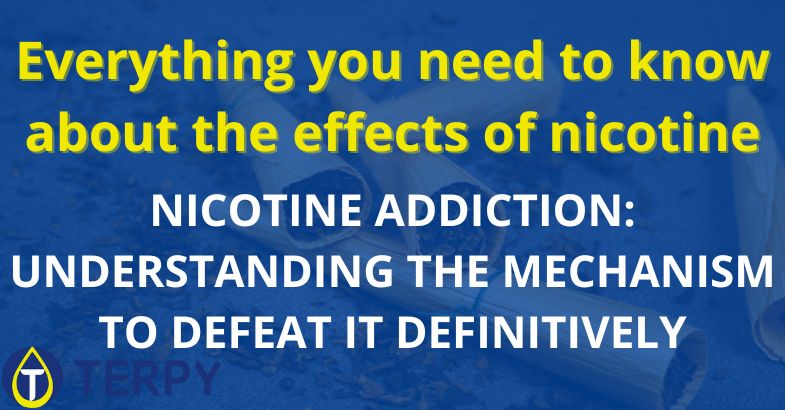Modified on: 24/05/2024
NICOTINE ADDICTION: UNDERSTANDING THE MECHANISM TO DEFEAT IT DEFINITIVELY
Nicotine has long been known as the main cause of cigarette addiction, but surprisingly many people still do not know in depth its effects and the mechanisms underlying addiction to this substance.
In the following article we will examine this topic, explaining how nicotine acts on the human body, how it enslaves smokers and how to break its chains by abandoning harmful cigarettes forever.
A brief presentation of nicotine and its effects
Nicotine, an alkaloid found in tobacco leaves , is famously associated with cigarette smoking, but is also contained in various other products, such as in smoking cessation devices such as chewing gum or mouth sprays.
When taken it produces a series of effects on the human body, some of which can be felt almost immediately.
At low doses, nicotine acts as a stimulant : it induces a slight increase in heart rate and blood pressure. This can lead to a feeling of alertness and improved concentration. In parallel, nicotine can suppress the feeling of hunger and temporarily reduce stress, providing a feeling of relaxation.
However, it should be emphasized that these effects are temporary and can lead to increasing dependence on the substance . Understanding these properties is absolutely crucial for anyone who wants to quit smoking once and for all.
These are the supposed positive effects of nicotine
Although nicotine is often associated (rightly) with negative effects on the human body, due to its role in smoking and tobacco addiction, it also has a number of characteristics that can be perceived as positive by those who take it.
When introduced into the body, for example, it can temporarily improve concentration and attention. This increase in cognitive abilities is often accompanied by a feeling of vigor and greater reactivity, making the individual more ‘present’ and focused in their activities.
Additionally, many people experience appetite suppression after taking nicotine or liquid nicotine, which can offer brief relief from feelings of hunger.
These dynamics, combined with the feeling of relaxation and stress reduction that often accompanies the use of nicotine products, help explain why so many people rely on this substance, despite the known risks associated with its prolonged use .
However, it is essential to remember that while these positive effects may seem attractive, nicotine is a highly addictive substance and regular use can lead to significant side effects and long-term health risks.
Read also: How to stop smoking on your own (even with an electronic cigarette)


The effects of nicotine on the human brain
Nicotine, despite being a small molecule, has a surprisingly powerful impact on our brain .
When inhaled or taken in through other routes, this substance rapidly reaches the central nervous system, influencing a variety of neural processes. One of the primary effects is the activation of nicotinic acetylcholine receptors , causing the release of numerous neurotransmitters, including dopamine. The latter, often described as the ‘pleasure’ neurotransmitter, plays a fundamental role in the sensation of gratification and in the strengthening of habits, explaining the rapid addiction that many develop towards products based on this molecule.
In addition, nicotine can also alter levels of serotonin, norepinephrine, and other key compounds , affecting mood, attention, and stress response. These neurochemical changes often lead to improved perception of mood and alertness, but, in the long term, they can also lead to imbalances and addiction.
It is crucial to highlight that while occasional nicotine intake can offer temporarily euphoric or relaxing effects, constant exposure can alter brain structure and function, leading to an increasing need for the substance to achieve the same effects – the classic sign of dependence.
The most common questions about nicotine (and the answers)
Since nicotine has been at the center of attention for decades due to the large number of smokers who continue to harm themselves every day due to the addiction caused by it, numerous questions are circulating about it. Here are the most frequently asked questions and their answers.
What is nicotine?
It is a natural compound found primarily in tobacco leaves, and is the substance responsible for addiction to cigarettes and other tobacco products.
Is nicotine harmful in itself?
While nicotine is the main culprit in tobacco addiction, most of the health damage caused by smoking is due to other substances present in cigarettes. However, nicotine can have side effects and lead to health problems if taken in high doses, especially affecting the cardiovascular system.
Is it possible to quit smoking using nicotine products?
Yes, many smokers turn to nicotine replacement therapies, such as patches, gum, sprays, or even e-cigarettes as a bridge to reduce and ultimately eliminate their addiction.
Does nicotine affect the brain?
Absolutely yes. As we have seen previously, nicotine can affect concentration, mood and can lead to addiction by modifying the release of various neurotransmitters in the brain.
Are there benefits to using nicotine?
Some studies suggest that nicotine may have nootropic effects, meaning it may temporarily improve some cognitive functions. However, these potential benefits are completely overshadowed by the risks associated with its intake, especially when consumed through smoking.
The mechanism of nicotine addiction
Nicotine is often at the center of conversations about addiction and harmful habits, and not without reason. This chemical, contained in tobacco leaves, is known to be responsible for addiction to cigarettes and other tobacco products.
But what is it that makes nicotine so irresistible to many?
We have already mentioned several times that this substance is potentially capable of causing a very strong addiction. Let’s see below how all this happens, starting from its interaction with the central nervous system , already briefly discussed previously.
Once introduced into the body, nicotine rapidly stimulates the release of dopamine in the brain, a neurotransmitter closely associated with feelings of reward and gratification. Because of this quick rush of pleasure, many people continue to consume nicotine products so as not to break the ‘vicious cycle’ of gratification, cementing a cycle of addiction .
Nicotine withdrawal is the downside .
When an individual attempts to reduce or completely eliminate the intake of this substance, the symptoms of deficiency often manifest themselves intensely. These can include irritability, insomnia, increased appetite, difficulty concentrating and a strong craving for nicotine and arise because the brain, accustomed to regular doses of nicotine, begins to ‘require’ it more and more often to function normally.
That’s why quitting smoking and breaking free from nicotine addiction can be a challenging journey . The key to dealing with withdrawal and overcoming addiction is understanding your relationship with nicotine and seeking help, which can come through the use of specific tools, counseling, substitution therapies or community support.
How to overcome nicotine addiction
Quitting tobacco is a path that requires commitment, determination and, in many cases, a profound change in daily habits. If you are among those who wish to free themselves from the grip of nicotine, here are some practical tips and strategies that could ease your journey towards a smoke-free life.
Define your ‘Why’ : First of all, it is essential to understand and clarify to yourself the reasons why you want to quit. Whether it’s health, family, finances, or another personal reason, keeping this in mind will provide you with the motivation you need during difficult times.
Seek support : Sharing your goal with friends, family or support groups can make a difference. Having someone to talk to during withdrawal or when temptation becomes strong can be a great help.
Replace the habit : Find alternatives to smoking that distract you and keep you busy, such as chewing gum, keeping your hands busy, or going for a short walk and other types of physical activities.
Avoid temptations : Recognize your triggers and do your best to avoid them. Whether it’s a coffee after dinner or a drink with friends, try to change your routine or environment to reduce the times you might feel tempted to smoke.
Use all the tools and resources you think will help you : Today there are numerous resources, from smartphone apps to nicotine replacement therapies, that can offer you the support and tools you need to quit. Take advantage of them and try to find the ideal one for your specific case.
Celebrate the small successes : Every smoke-free day is a victory. Celebrate it. Whether it’s saving money you would have spent on cigarettes or treating yourself to a small treat, reward yourself for your progress.
Don’t be discouraged : if you ‘stumble’ don’t consider it a failure. Many former smokers have relapsed before finally quitting. The important thing is to learn from the experience and try again stronger than before.
The road to saying goodbye to tobacco may seem arduous, but with commitment, resources and the right mindset, it is absolutely possible to follow it all the way. And remember, every step forward brings you closer to a healthier, happier version of yourself.


The electronic cigarette as an aid in fighting nicotine addiction
In recent times, the e-cigarette has emerged as a popular tool among those seeking to reduce or eliminate their consumption of traditional cigarettes .
But how exactly does it work and how can it be useful?
Electronic cigarettes , often called e-cigs or vapes, offer a complete simulation of the act of smoking, allowing the user to inhale vapor rather than smoke. This vapor can contain nicotine in different concentrations, giving the user the possibility to regulate and gradually reduce his intake over time. Such a gradual approach to reduction can make the cessation process more manageable for many.
Another significant advantage of e-cigs is the absence of many of the harmful and carcinogenic substances present in combustible tobacco. However, it is essential to highlight that while e-cigarettes can reduce exposure to some toxic molecules, we still do not know whether they are completely risk-free. In all likelihood they are decidedly less harmful than tobacco, but science has not yet shed full light on these devices .
Among the strong points of e-cigs that help many smokers to move away from cigarettes is the variety of concentrated flavors and liquids for electronic cigarettes available in the best Italian shops and the possibility of personalizing the vaping experience. These factors contribute to facilitating the transition from analogue to electronic and, therefore, from dependence to gradual freedom from nicotine .
Read also: Is it better to vape or smoke? Here is the definitive answer
In conclusion
Addressing nicotine and its complex connection to our health and well-being is a journey that many undertake, but unfortunately not all are able to complete.
A deep understanding of the effects caused by this substance is essential for making informed decisions regarding your health.
While nicotine can offer brief moments of relief and concentration, the associated risks, particularly addiction and harm from consuming tobacco products, are real and can have lasting consequences.
Fortunately, we live in a time where resources and support for those looking to kick the smoking habit are abundant.
The decision to quit, or not to start at all, is a significant step toward a longer, healthier, more rewarding life. So as you consider your relationship with nicotine, remember that you have the power to choose the path that’s right for you and your health .
If you are a smoker and want to tackle this path, consider the possibility of replacing your cigarettes with an electronic cigarette , with the aim of overcoming the addiction and abandoning this device in the long term. Here on Terpy you can find the e-cig that’s right for you and many e-cigarette liquids that will help you overcome your bad habit.
Take Aways
- Nicotine, an alkaloid found in tobacco leaves, has stimulant effects at low doses, such as increasing heart rate and blood pressure, but these effects are temporary and can lead to increasing dependence.
- Despite being known for its negative effects, nicotine can temporarily improve concentration, reduce stress and suppress appetite, explaining why some people use it despite the associated risks.
- Nicotine has a strong impact on the brain, activating nicotinic acetylcholine receptors and affecting neurotransmitters such as dopamine, causing addiction.
- Nicotine is a natural compound found in tobacco, it can be harmful if taken in high doses and affects mood and addiction. However, some studies suggest temporary positive effects on cognition.
- Nicotine is highly addictive by stimulating the release of dopamine in the brain, keeping users in the “vicious cycle” of reward. Withdrawal causes symptoms such as irritability and nicotine cravings, making it difficult to quit.
Questions and answers
What are the effects of nicotine?
Nicotine, when taken, produces effects such as increased heart rate, blood pressure, appetite suppression and temporary reduction of stress. However, these effects are temporary and can lead to increasing dependence on the substance.
How does nicotine cause addiction?
Nicotine causes addiction by stimulating the release of dopamine in the brain, a neurotransmitter associated with feelings of reward and reward. This creates a reward cycle that leads many people to continue consuming nicotine to maintain this sensation, thus developing a strong addiction. Nicotine withdrawal causes intense symptoms, prompting people to seek additional doses to relieve them.
What to do to overcome nicotine addiction?
To overcome nicotine addiction, it is important to define your ‘why’ for quitting, seek support from friends, family or support groups, replace the smoking habit with other activities, avoid situations that may lead you to smoke, use tools and resources such as smoking cessation therapies or apps, celebrate successes and not be discouraged if you relapse.





